Turning the Pages: Medieval Reading Practices and the Contents of Late Medieval Dream Guides
Boyda Johnstone
Fordham University
bjohnstone1@fordham.edu
@boydajosa
John of Salisbury on Dream Guides
Surely if ambiguous language is used which lends itself to many interpretations would not one be justly regarded as quite ignorant who, as a result of it, stubbornly makes some particular decision without taking into consideration these meanings? All things involve varied and manifold meanings, as has been stated above. Careful discrimination is to be made amid this multiplicity of meanings, lest by following one line too enthusiastically there be a tendency to fall into error. Hence the dream interpreter which is inscribed with the name of Daniel is apparently lacking in the weight which truth carries, when it allows but one meaning to one thing. This matter really needs no further consideration since the whole tradition of this activity is foolish and the circulating manual of dream interpretation passes brazenly from hand to hand of the curious.
Policraticus Book II, Ch. 17
Interpretations of Daniel
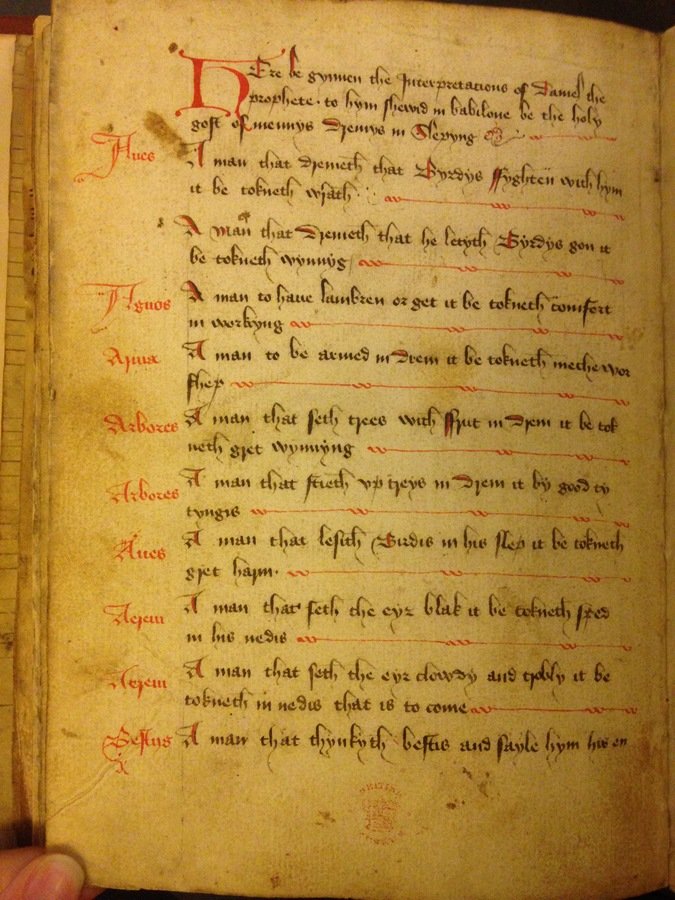
British Library MS Sloane 1609, ff. 29v-30r
Here bygynnen the Interpretacions of Daniel the prophete to hym shewid in Babilone be the holy gost of mennys dremys in slepyng. --------------
Aues A man, that dremeth that byrdys ffyghten with hym it be tokneth wrath----------------------
A man that dremeth that he letyth byrdys
gon, it betokneth wynnyng-------------------
Agnos A man to haue lambren or get it be
tokneth comfort in workyng----------------
Arma A man to be armed in drem it be tokneth
meche worshep-----------------------------
Arbores A man that seth trees with ffrut in drem
it be tokneth gret wynnyng-------------------
Arbores A man that stieth vp treys in drem it by
good tydyngis----------------------------------
Aues A man that lesith birdis in his slep it be
toknith gret harm
"yf þou be dremyd with any of these þynges after þe tokenes folowyd after"
British Library MS Sloane 297, f. 112r
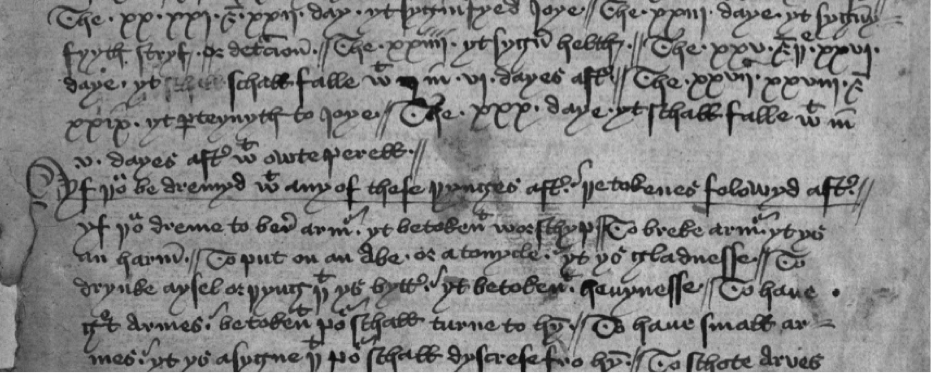
Trinity College Cambridge MS 1449 (0.9.37)
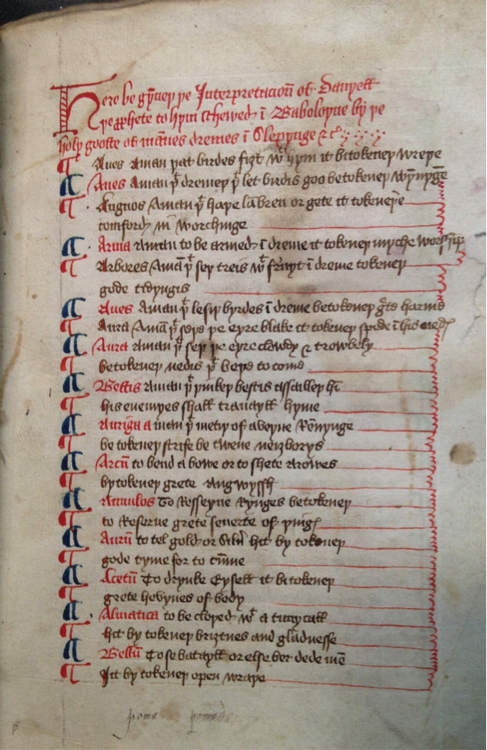
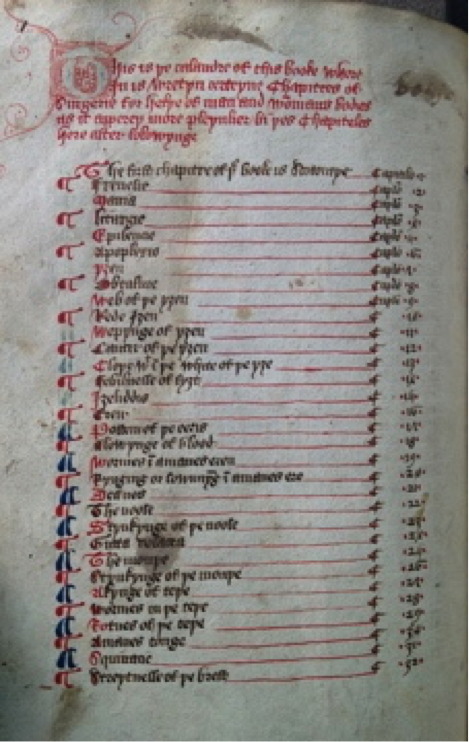
Gilbertus Anglicus's Compendium Medicinae (f. 34v)
Dreams of Daniel (f. 26r)
York Minster MS XVI.E.32, ff. 124v-125r
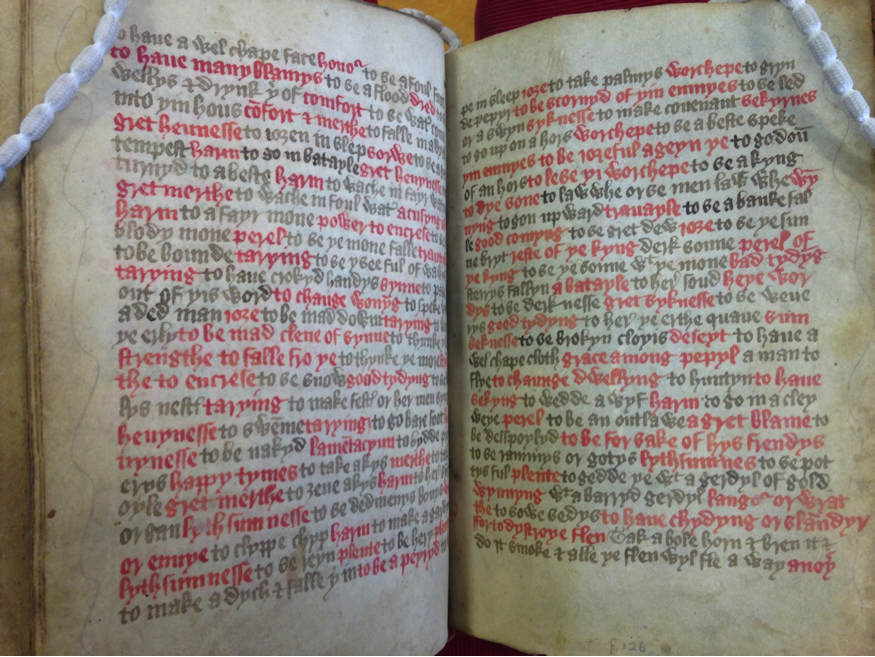
British Library Ms Harley 2253, f. 119r
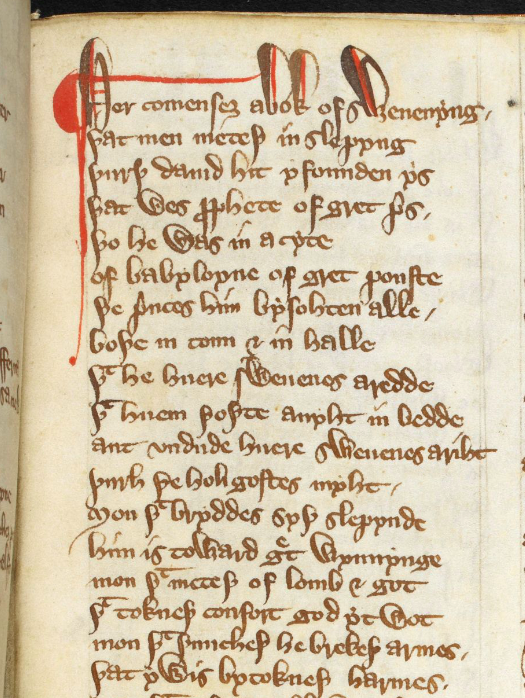
Her comensez a bok of swevenyng,
Þat men meteþ in slepyng;
Þurþ Dauid hit yfounden ys
Þat was prophete of gret pres [excellence],
Þo he was in a cyte
Of babyloyne of gret pouste [dominion]
The princes him bysohten alle,
Bothe in toun & in halle,
Þat he huere swevenes aredde [interpret],
Þat huem þoþte anyht in bedde;
Ant vndude [undid] huere swevenes ariht
Þurþ the Holi Gostes myht [power].
Mon that bryddes syþ [sees birds], slepynde:
Him is toward gret wynnynge.
Mon þat meteþ of lomb & got [goat]:
Þat tokneth confort, God yt wot.
Mon þat þuncheþ [thinks] he brekeþ armes:
Þat ywis bytokneþ harmes.
The Nun's Priest's Tale, ll. 2926-2939
Pertelote:
Certes this dreem, which ye han met to-nyght,
Cometh of the greete superfluytee
Of youre rede colera, pardee,
Which causeth folk to dreden in hir dremes
Of arwes, and of fyr with rede lemes,
Of rede beestes, that they wol hem byte,
Of contek [discord], and of whelpes, grete and lyte;
Right as the humour of malencolie
Causeth ful many a man in sleep to crie
For feere of blake beres, or boles blake [black bulls],
Or elles blake develes wole hem take.
Of othere humours koude I telle also
That werken many a man sleep ful wo;
But I wol passe as lightly as I kan.
The Monk's Tale, ll. 2926-2939
Upon a tree he was, as that hym thoughte,
Ther Juppiter hym wessh, bothe bak and syde,
And Phebus eek a fair towaille hym broughte
To dryen hym with; and therfore wax his pryde,
And to his doghter, that stood hym bisyde,
Which that he knew in heigh sentence habounde,
He bad hire telle hym what it signyfyde,
And she his dreem bigan right thus expounde:
"The tree," quod she, "the galwes is to meene,
And Juppiter bitokneth snow and reyn,
And Phebus, with his towaille so clene,
Tho been the sonne stremes for to seyn.
Thou shalt anhanged be, fader, certeyn;
Reyn shal thee wasshe, and sonne shal thee drye."
Thus warned hym ful plat and ek ful pleyn
His doghter, which that called was Phanye.
Turning the Pages: Medieval Reading Practices and the Contents of Late Medieval Dream Guides
Boyda Johnstone
Fordham University
bjohnstone1@fordham.edu
@boydajosa